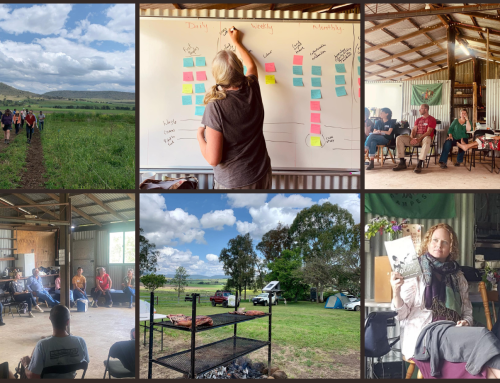Do you want to help drive the fight for food sovereignty in 2022? Nominations are open for the AFSA National Committee for 2021-2022
AFSA is governed by a National Committee made up of farmers and allies, elected by our members at AFSA’s Annual General Meeting each year at the end of the Food Sovereignty Convergence, where we form our mandate by listening to the needs of members and collectively prioritise the work for the year ahead.
We encourage farmers and allies with a passion for transforming our food system to join in the work of the National Committee representing our members and building the movement.
Call For Nominations to the AFSA National Committee
AFSA’s Annual General Meeting will be held on Sunday 24 October 2021 via Zoom (AGM registration details for members coming soon).
The AGM will include the election of office bearers and general members of the National Committee for the 2021-2022 year.
Expressions of interest are open now for those wishing to nominate as a general member or for an office-bearer role.
If you are interested in nominating for a position please email a short bio expressing your interest to admin@afsa.org.au to receive a nomination form, or contact us if you would like to find out more about the roles and nomination process.
Members of the National Committee must be AFSA members, and nominations for positions to the new National Committee must be endorsed by two members of AFSA.
Please contact admin@afsa.org.au if you do not already know two AFSA members to endorse your nomination. If you are not yet an AFSA member, you can start your membership here.
Details of the individuals who have nominated for the new Committee will be made available on the AFSA website before the AGM.
Nominations will close on 18th October.
Position Descriptions
General Members
General members of the National Committee participate in the democratic governance of the organisation through Committee meetings held online every 4-6 weeks, and input into governance decisions on an ad hoc basis. Committee Members collectively develop AFSA’s strategic plans according to the mandate of our members, provide input into AFSA campaigns, and support the implementation of work plans as agreed by the Committee.
General members of the National Committee may also lead or participate in working groups to implement campaigns, events, and other AFSA activities, according to their capacity and availability.
The National Committee meets at least six times per year online, and twice per year in person.
Office Bearers
Role of the President
Charged with providing leadership and direction to the Committee, the President is responsible for ensuring that the Committee fulfils its responsibilities for the governance and success of the organisation, and is responsible for providing direction to the staff of the organisation.
The President is also the primary liaison with farmer-led international organisations working for food sovereignty such as La Via Campesina, and the International Planning Committee for Food Sovereignty (IPC).
S/he communicates regularly with all members via the AFSA website and regular newsletter. The President is generally the spokesperson for the organisation and should work to maintain key relationships within and outside of the organisation. The President must be a farmer who is actively farming.
Role of the Vice President
The Vice President is responsible for assisting the President to fulfil their responsibilities for the governance and success of the organisation. S/he also works to optimise the relationship between the Committee, volunteers, and members, and to achieve the organisation’s agreed goals. The Vice President monitors memberships, and provides membership reports at each meeting of the Committee.
S/he also leads membership drives and supports the Committee in developing strategies for growing and maintaining membership, and helps lead membership engagement through social media and a regular newsletter. The Vice President typically fills in for the President when s/he is on leave.
Role of the Treasurer
The Treasurer is responsible for the financial supervision of the organisation to allow the Committee to provide good governance of the organisation. The Treasurer’s tasks include the preparation of annual budgets, planning for the organisation’s financial future and monitoring the organisation’s revenue and expenditure. It is desirable that the Treasurer is well organized and possesses a level of financial expertise.
Role of the Secretary
The Secretary is responsible for the documentation and communication of the activities of the Committee. The Secretary is the primary administration officer of the Committee and provides the links between the Committee, members and outside agencies.
The Secretary should be a good communicator, maintain confidentiality on relevant matters and have the ability to delegate tasks and supervise others. The Secretary oversees the preparation of agendas and minutes, and all AFSA governance documents (constitution, regulations, policy), especially in advance of the AGM.
Role of the Communications Officer
The Communications Officer develops and implements effective internal and external communications strategies to maintain and build the reputation of AFSA with key publics including allied organisations, media, government and members. S/he supports the team with feedback on a range of communications pieces.
A key element of the role is media relations, requiring the monitoring of news media to identify opportunities to attain media coverage, and the production of media releases and rich content for the website and promotional materials.
S/he also assists staff to effectively field inquiries from stakeholders including journalists, politicians, members, and the general public is an ongoing responsibility. The Communications Officer collaborates with the Administrative Assistant in planning, writing and distributing the electronic newsletter.
Role of the International Officer
The International Officer (IO) is responsible for maintaining connections with international food sovereignty organisations. Where there is a budget and it is appropriate, the IO attends meetings and conferences with groups such as the IPC and FAO thematic symposia, and is responsible for reporting back to the committee and members.
In collaboration with AFSA staff and others on the Committee, the IO stays informed about global issues relating to food sovereignty and communicates these to members via newsletters and social media.
Role of the Events Officer
The Events Officer co-ordinates the planning, organisation, and implementation of AFSA events, with the support of the Administration Assistant. AFSA holds or facilitates a range of events to raise awareness of AFSA’s work, tp mobilise members for actions and campaigns, or to raise funds, including through promotion of AFSA products and fundraising-specific events.
AFSA runs several regular events, including the annual Food Sovereignty Convergence and the biannual Slow Meat event. AFSA also organises one-off events as part of fundraising or campaigns, or to increase exposure of AFSA’s work, such as the promotion of AFSA’s book, Farming Democracy.
In addition to these, the Events Officer will, with the support of the Communications and Membership Officers, identify new opportunities for events to support members, increase public exposure of AFSA’s work, engage new membership, or raise funds. The Events Officer will also support the National Committee members and staff to identify and participate in external events to represent and promote AFSA’s work.
Role of the Memberships Officer
The primary role of the Memberships Officer is to develop and carry out strategies to increase and maintain AFSA membership. This includes working with the Events and Communications Officers to identify new opportunities for member engagement, and develop communications and events to support the membership strategy.
The role also includes building engagement with current members, identifying members’ needs and opportunities for AFSA to provide members with benefits or support. This may include identifying and communicating external or internal activities where AFSA can offer new member benefits and providing updates to members about current benefits of membership. Finally, the Membership Officer will collaborate with the Administration Assistant to monitor membership, maintain membership databases, and respond to member queries.
If you have any questions or concerns, be sure to reach out to admin@afsa.org.au for more details.




